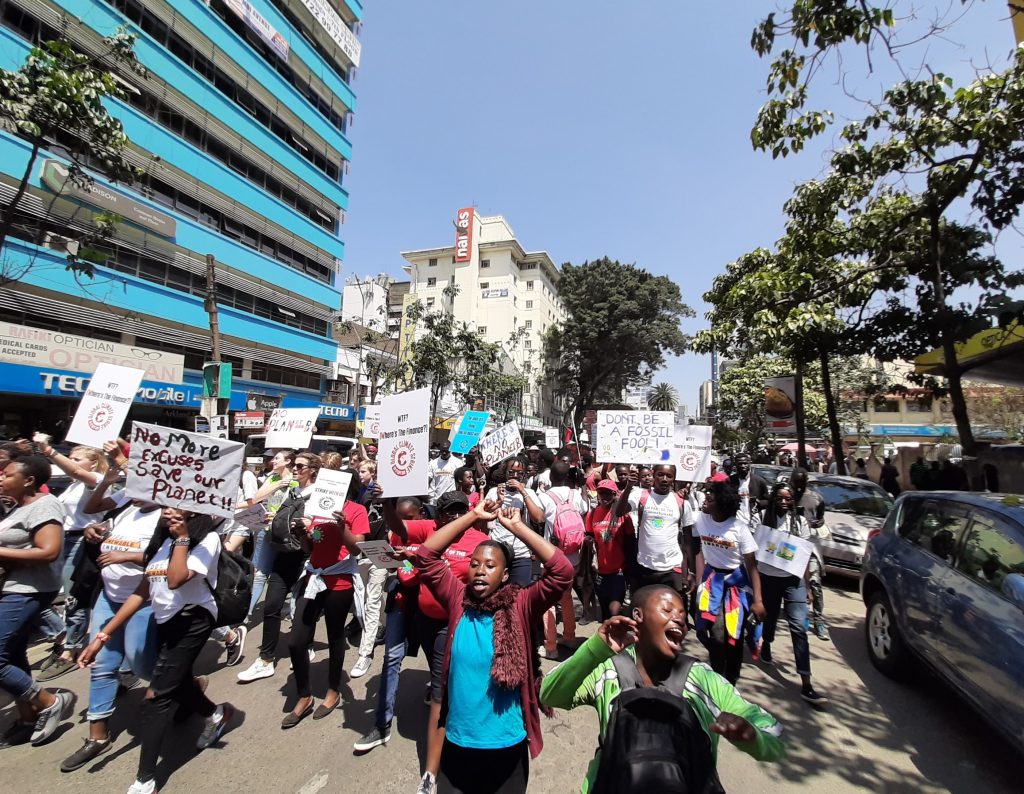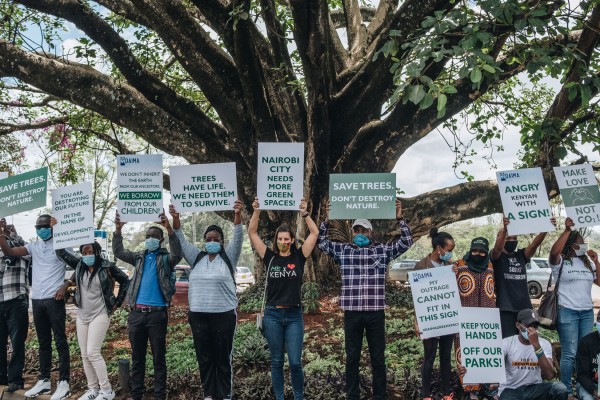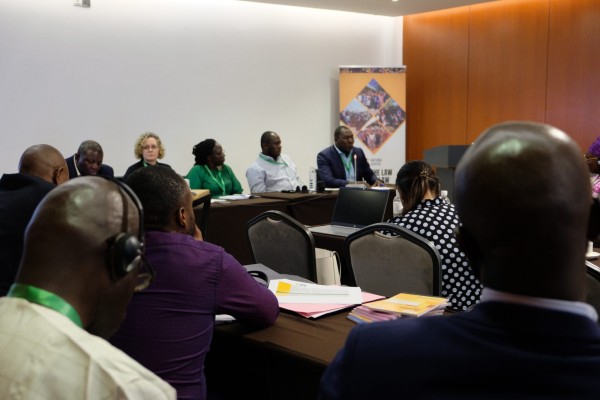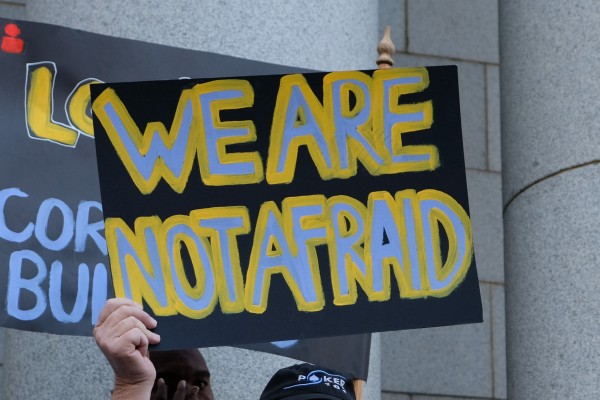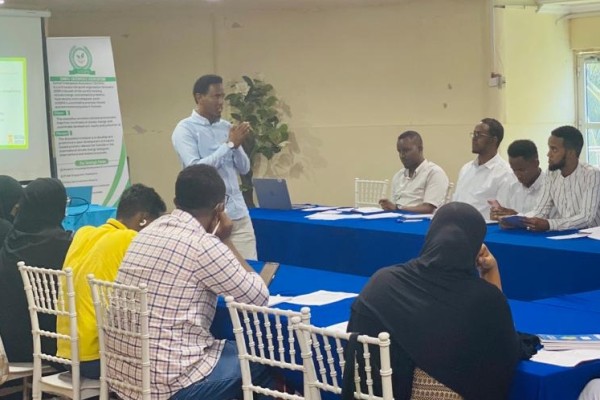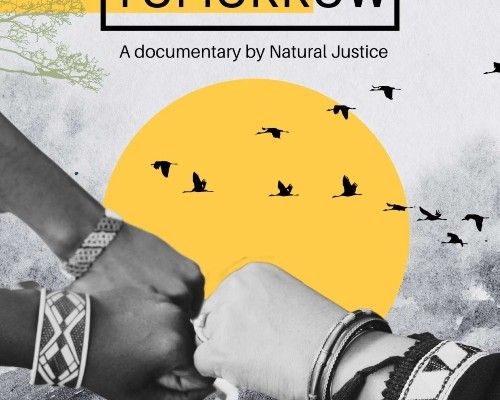Each and every human being is born with fundamental rights. Yet, in many countries across the world, many of these rights do not exist on paper, or are eroded by governments and industries. For some people, like environmental and land defenders, failures to enact or uphold rights mean that their lives are threatened and their activism can put them in harm’s way.
According to the United Nations Environment Programme (UNEP), environmental defenders are people who take peaceful action, either voluntarily or professionally, to protect the environment and natural resources from over-exploitation. They are often ordinary people who have a passion to protect, conserve and speak up for nature, with hopes to reverse the damage done by a profit-driven, consumerist society.
There is a fallacy that exists that environmental defenders are against development. In contrast, they value the earth and are concerned that we are using unsustainable practices that are eroding nature to the point where the lives of our children and children’s children will be undermined. They fight to protect the natural environment for the health of all people and future generations!
Threats to environmental defenders
Because they speak truth to power, environmental and land defenders are the most targeted group of human rights defenders. The Global Witness report ‘’Defending Tomorrow: The climate crisis and threats against land and environmental defenders ‘’ released in July 2020, is chilling.
They state that, “Our annual report into the killings of land and environmental defenders in 2019 shows the highest number yet have been murdered in a single year. 212 land and environmental defenders were killed in 2019 – an average of more than four people a week.”
Attacks on defenders are widely documented in developing countries: namely the Philippines, Guatemala, Romania, Kazakhstan, the Democratic Republic of Congo, Uganda, Brazil and Ghana. At Natural Justice, we have also documented attacks in Kenya and Senegal, and know of attacks in South Africa. Unfortunately, conflicts, evictions and land grabbing in these countries, which often spur defenders into action, are expedited by corrupt government officials, organised crime, businesses and corporations, which are all very powerful entities.
Despite the good that environmental defenders do for our world, they are not being protected with the necessary assistance that they deserve. For example, the fight against the burning of the Amazon rainforest is led by local indigenous peoples, with little-to-no help from their government. They often fight alone against greedy companies and powerful people, putting their lives in grave danger.

Human rights that provide a space for defenders to work effectively
Those in power need to be questioned and held accountable for their actions. To do so, environmental defenders require a full array of rights to support their work. Knowing their rights and the frameworks within which they undertake their activism, can not only create a space for them to work effectively, but keep them out of harm’s way.
Below are human rights that would allow for environmental defenders to work effectively.
What is becoming increasingly recognised as a fundamental right is the right to a safe, clean and healthy environment. From this, we can guarantee other rights, like the right to water, food, health and life. UNEP states that 150 countries have this right in their constitutional frameworks and it is the basis for other rights, but can also be the basis from which defenders work – an empowering right that communities often cite in their struggles against polluters. Without this right, defenders may find litigation and advocacy more difficult.
The right to information allows defenders to be able to access information about activities on their land or territories and take part in public participation processes. They are also able to use that information to inform the public, their communities and their allies about the threats they face. With information, they are able to present the facts in court as evidence that their territory is threatened.
The right to freedom of thought, belief, conscience, religion, opinion and expression are important to defenders so that they may express themselves. They have the right to express their opinion, either vocally, in writing, in the form of art, or through any other media of their choice, at the local, regional, national and international levels.
The right to life is a constitutional right in some countries, which may protect defenders from the governments taking severe and lethal actions against them. In countries that are severely oppressive or authoritarian, this right is repeatedly infringed on, and defenders in these countries are at great risk of disappearing, being assassinated or facing capital punishment.
Closely associated with the right to life, is the principle of dignity, which requires governments and their entities, businesses, corporations and anyone else to respect the integrity and dignity of defenders, to not discriminate against them and to treat defenders fairly. It is the moral foundation for all other rights and freedoms.
Freedom from arbitrary arrest or detainment means that, should a defender be arrested for their activities, they must be arrested according to a specified and fair process. Closely tied to this is the right of access to justice, including the right to have access to free legal representation facilitated by the State where a defender is accused of committing a crime. The latter right also includes the right to a fair hearing.
The right to fair administrative action speaks to instances where frivolous law suits are brought against defenders – most notorious are the strategic lawsuit against public participation (SLAPP) suits. Most of the time, the decision to prosecute the defender is not necessarily because they did what they are accused of doing, but as a result of abuse of power by the government or industry bringing the law suit. In South Africa, a well-known SLAPP suit was brought to intimidate activists and lawyers, who were accused of defamation. This right also facilitates a fair process of defenders who might file complaints against government entities or corporations about human rights abuses, and for these complaints to be taken seriously by the relevant bodies.
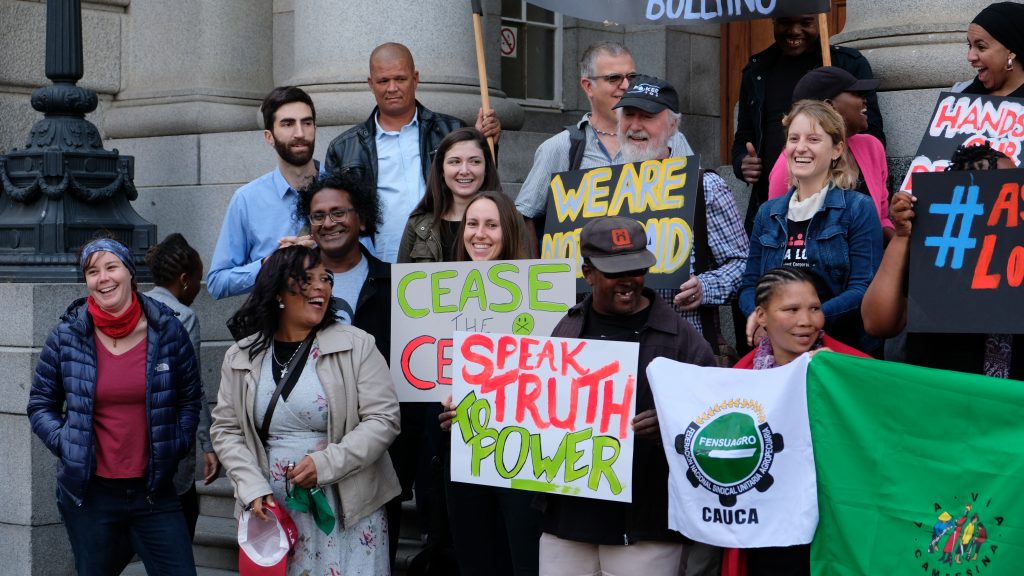
The right to protest or freedom of assembly plays a significant role in the civil, political, economic, social and cultural life of all societies. Protests have repeatedly encouraged positive social change and the progression of human rights, and they help to guard our shared spaces in all parts of the world.
The right to movement advocates for the state to take appropriate measures to facilitate the freedom of movement of people working in rural areas. Without the right to movement, defenders are unable to mobilise their communities, spread information or, if needed flee a source of danger.
There are less traditional rights that are becoming more widely recognised in legal spaces, such as the right to internet. The right to internet is becoming more recognised as it allows for defenders working in rural or far flung places to be connected to international advocacy spaces. It helps to promote rights like that of freedom of expression and the right to protest and right to information. Increasingly, having access to technology and internet access is seen as an important aspect of defenders’ ability to do their activism.
Closely linked to this and other rights, is the right to privacy, which provides for defenders’ work, identity, family and associates to be able to act without arbitrary or unlawful surveillance or oversight from government or corporations. It provides for defenders to work with freedom both physically and within the online space. It provides that their correspondence is not unlawfully intercepted and it ensures that the are not threatened or harassed.
Land rights are vital to protecting indigenous people and local communities. Having secure land rights, whether individual or collective, means securing their lives and livelihoods now and for future generations. It is also central in protecting our climate, as it provides for maintaining forests and other lands which are important for our planet’s health. If there is no legal recognition, our unprotected lands, like the forests, are more likely to be degraded.
Indigenous rights (and rights to cultural or religious freedom) are important as they recognise the right to protect someone’s cultural practices which are usually linked to the land and various cultural resources. Everyone has their own culture, and deserves to practice it. Defenders are often indigenous people who are not only protecting nature, but their way of life and identity. Another aspect of indigenous rights is that the UN, through the UN Declaration on the Rights of Peasants and Other People Working in Rural Areas, encourages states to provide this legal recognition and protection of indigenous people and their resources.
It is important to recognise that women defenders have unique needs related to threats associated with gender-based violence. The right to equality is especially important to women environmental defenders, as well as rights that protect them from rape, harassment and sexual assault.
All of these rights, as well as others, exist to make it conducive for defenders to do their work. Human rights are the basic rights and freedoms that belong to every person in the world, from birth until death. We must respect and uphold the rights of indigenous peoples and local communities, or else they exist merely on paper. Gratefully, over the past few decades, and increasingly so now, people worldwide have begun to stand with them and support their work and their rights. We need to listen to the voices of environmental defenders and help to strengthen them.
For a more comprehensive list of rights, please see the Living Convention here.

